
Whether study is your primary focus, you are juggling work and study or family and study, looking after yourself (self-care) is never more important. To be our best, we need to care for our physical well-being and mental well-being, create connections with family/whānau, friends and classmates and find ways to rejuvenate ourselves.
Think about the concept of Te Whare Tapa Whā and its four dimensions of well-being:
- Spiritual wellbeing | Te Taha Wairua
- Mental and emotional well-being | Te Taha Hinengaro
- Physical wellbeing | Te Taha Tinana
- Family and social wellbeing | Te Taha Whānau
When all these things are in balance, we thrive. When one or more of these are out of balance, our well-being is impacted.
Use the following ideas to help keep your study life in balance.

Self-care
- Make this one of your priorities. If you are feeling positive, then you are able to support the others around you.
- If you don't already have one, reflect on what or where is your ‘happy place’, create a mental visiou of a place that inspires, soothes, restores, and builds you up. Find time to visualise yourself in your happy place during breaks or just before and/or just after you complete a work session.
- Do you like to bake cupcakes, go for a run, practise yoga or read a book? Consider your physical well-being, but also your mental well-being and find that activity that rejuvenates and refreshes you.
- Take frequent (no more than 60 minutes between) breaks of various lengths.
- Short break: shake your fingers, look at something far away, stand up and stretch, grab a drink, stare at wall art, or at something out the window that brings you a spark of joy.
- Longer breaks: Take a walk, dance like no one is watching for three songs, or do five yoga sun salutations for example.
- Always turn off your phone's notifications during longer breaks if feasible.
- Do not consider browsing social media as much of a work break!
Tip
Prevent RSI (Repetitive Stress Injury)
Futuro.com provides tips for preventing injury that can occur from putting in too many hours at the keyboard without breaks.
"One of the most important preventive measures you can take is to simply pay attention to how you feel, and identify which movements or activities seem to be causing problems for you.
"Follow these simple tips to prevent RSI at work:
- Don’t slouch in your chair while sitting. Check your posture throughout the day and sit up straight.
- Make sure your keyboard is at the right height, allowing you to keep your hands and wrists straight. You can lessen stress with a few minor adjustments at your desk.
- Get up and STRETCH! A 5- minute stretch for every half hour of sitting is recommended. Be sure to stretch your fingers, hands, wrists, neck, and back."
_____
Sleep
- One of the easiest ways to look after yourself is to sleep. Research has proved that sleep is essential for memory and retaining what you’ve learned.
- Try to set a regular sleep schedule and aim for 8 hours a night.
_____
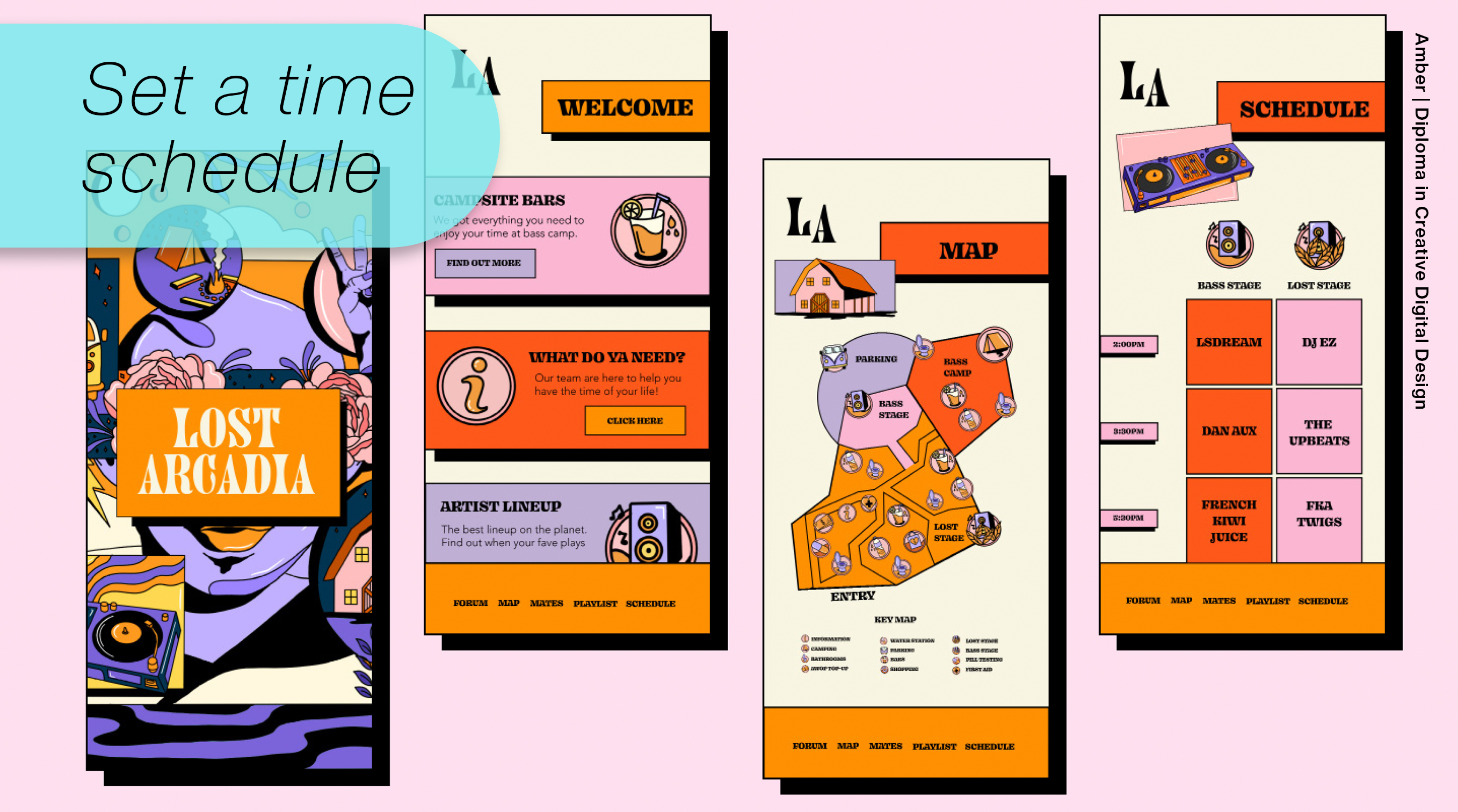
Set a schedule
- Online study is flexible. It works around the things you need to do in your life. Setting a schedule will help you fit everything in and keep on track.
- Incorporating breaks into your schedule is important: time away from study will help you focus.
_____

Fresh air
- Take a break outside. A change of scenery and time away from the screen will reset your mind and body.
_____
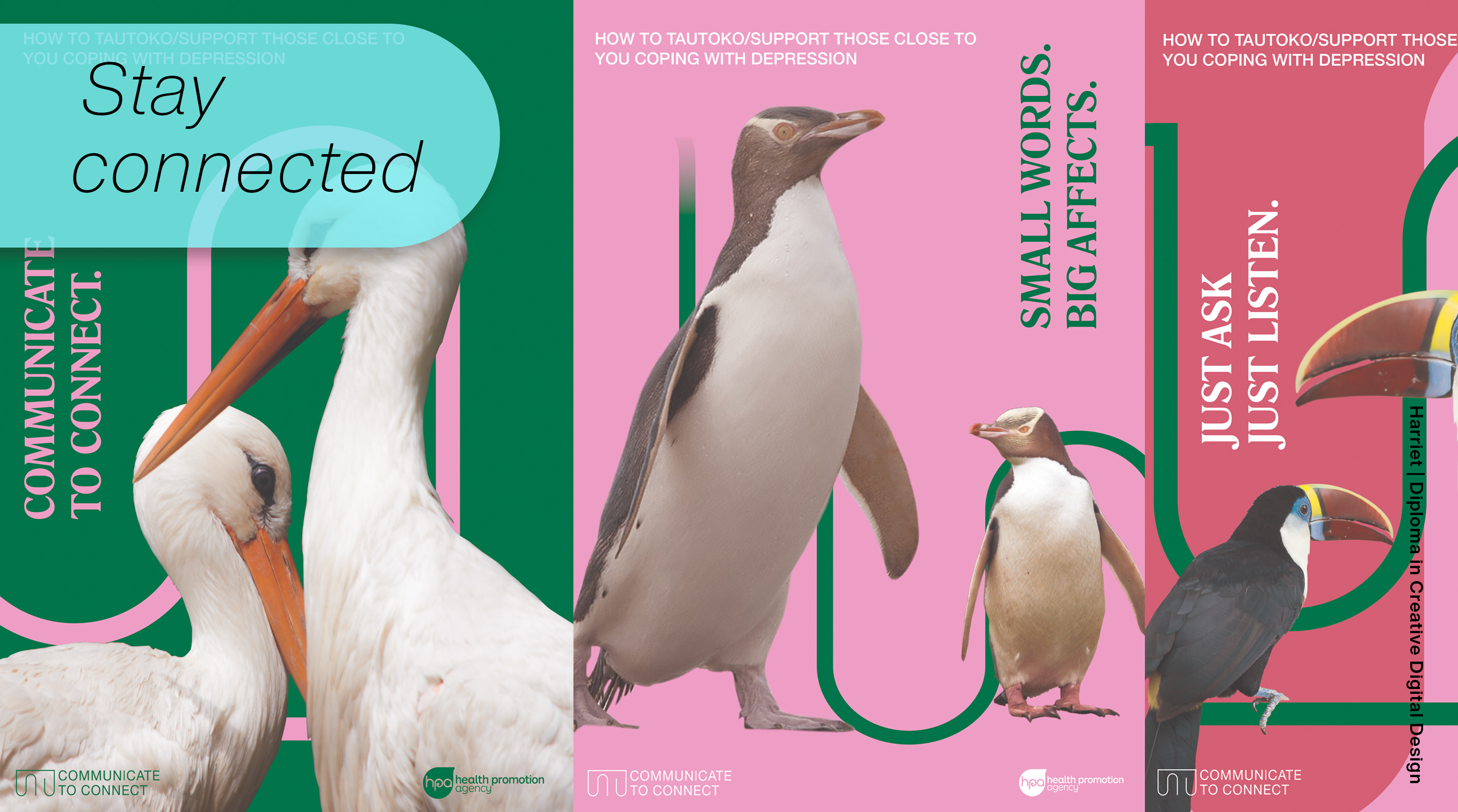
Stay connected
- Connections when you are studying online are very important. Online learning isn’t meant to be experienced alone. You are a part of a large, wider community that is all working toward the same goals.
- Stay engaged and contribute in online discussions, groups and shared activities. Connect to the face-to-face campus through social media. You are not only an online student but part of the Yoobee community.
- Get feedback from your online community or social group: feedback is an important tool when learning and should be viewed as a ‘gift’ of another pair of eyes looking to support you in your goals. Be open to feedback—even the best get told what is not quite right.
- Connect your studies with your family/whānau and/or friends. Let them know what you are learning, show them your draft project. They are part of your support system.
- Ask for help: reach out if you have a problem or need some support.
_____

Reflect
- Remember to look back at what you have achieved so far and be proud of your accomplishments.
- Take risks—dream big: Ask that question in your head. Connect with people to build your network and your community of practice. Experiment with concepts, ideas, and techniques. Have fun!
__________
You are an experienced learner. You have learnt things before, maybe in school, in a training course or through your work. You know what study methods work for you and have the skills to study. Online learning is different from face-to-face learning and not the same as lockdown learning experience during the COVID-19 pandemic. Use these tips to help you start and maintain pace in your study routines.
Set your schedule
- Get into a routine.
- Set your learning time each week and commit to that time. For part-time study, it’s an average of 15 hours per week; for full-time study, it’s about 30 hours per week.
- Be flexible if life demands occur.
- Take breaks if your learning time is a big chunk of time.
- Use lists to help you achieve the tasks.
Tips for staying on track
- Be realistic with your goals each week.
- Reward yourself when you’ve achieved a goal.
- Find an app that will support you in your study.
- Understand the difference between internal and external motivators. Draw on your internal motivation to get you through any slumps (PS: this usually occurs on the odd months of your enrolment).
Timekeeping
- Balance computer study time with inspirational study time. Creativity is not just about working on a computer app but being inspired by the world around you.
- Minimise distractions. Put your mobile on silent. Close the other windows in your browser. Turn off the music if that does not help you (or turn it on if it does).
- Use a list, and note anything that is hanging around on that list. That might show procrastination about doing a task.
- Put dates into your calendar with reminders set earlier than the due date.
Thinking about why you are doing this programme? What are your goals?
- Share your goals and your projects with friends and whānau.
- Big picture, little picture – the whole qualification vs the current section or topic, the next four weeks vs this week. Look at how your action at this moment feeds into the overall plan.
- Reflect on your previous successes. Use the skills you learnt then for your study now.
Connect with others
- Know who to contact if you need support (IT problems, course enrolment, pastoral care, learning support).
- Use the messaging service/chat for quick learning-related questions.
- Attend the Day 5 meeting.
- Be involved in the online forums and peer feedback. Find out your tutor’s online time.
- Join the Yoobee Live Sessions.
- Find a study buddy within the group - someone who understands the demands, joys and stresses of study.
- Come to any Yoobee events if possible.
- Follow Yoobee’s social media.
Give mana to your mahi - Academic Integrity
Your approach to study and assessments is a skill that transfers when you are working in your chosen industry. Academic integrity turns into professional integrity. Having academic integrity means that you:
- take pride in what you have produced, designed, developed, and written about through putting in the effort by yourself or as part of a team.
- acknowledge others by attributing resources used through in-text citations and a reference list. For guidance, use Massy University's OWLL (Online Writing and Learning Link) or Auckland University's Quickcite.
- use AI tools as a way to help you critically think or reflect on aspects not considered.
- paraphrase from resources, theories and references to apply external information to your internal work.
- understand assessment briefs/tasks, clarify your understanding and plan out the approach to assessment, giving yourself time to focus and achieve the task to your best ability.
- learn and apply your knowledge of copyright to your work.
For a bit more information, see below How assessments work - Academic integrity and copyright and the Assessment section of the Student Handbook.
Feed your body as well as your mind
- Read the section on Looking after yourself again. :)
Handy tips from Yoobee students:
SarahI find having a detailed list helps me keep organised and encourages me to do more of the tasks that need to be done.
For example, instead of putting down 'research target audience', I'd break it down into lots of quick and easy things like 'choose an age group', 'find their interests', 'what do their daily lives consist of?' and so on ~ makes me feel like I've accomplished lots when I see lots of tasks crossed off my list.
LukeI stay motivated by knowing that I'm creating my own future, and what works for me is that I always think about the possibilities and opportunities I can have when I finish this course and the courses to come.
A tip I would give is to pace yourself, write down what you are going to do for the day and have a timetable so you know when to study and when not to study. This helped me a lot because I am easily overwhelmed, and might help others as well.
Assessments are the way your tutor(s) confirms you have achieved the learning outcomes for the module. Successfully demonstrating the learning outcomes results in passing the module, the programme, and ultimately leading to graduating with the qualification.
Refer to the Programme Outline for details on what assessment is in your programme.
In your programme, there will be assessment tasks - maybe a poster, maybe a short film or animation; whatever the task is, you will receive information on what to do. Formative (developmental/progress) assessment supports your understanding of the content and allows you to practise the skills and receive feedback before the summative (graded/marked) assessment.
An assessment brief should contain all the information you need to complete an assessment.
An assessment brief could contain key information on:
- The purpose: what is the reason for this assessment?
- Goals of the assessment: what the outcome would be once the project is produced.
- Requirements: all the relevant technical information for the project, which could include sizes, printing specifications, file size, target markets, technical specifications, format of the final piece, etc.
- Deadline: when the project needs to be presented or handed in.
At the start
All assessment briefs may be written differently, but they all can be tackled in the same process:
Step One: Very carefully read all information in the assessment brief.
Step Two: Read over all information in the assessment brief again, this time noting or highlighting any key words. Look for words that tell you the project purpose, goals and particularly take note of anything technical and hand-in requirements. Add the due date to your calendar.
Once you have a thorough understanding of what the brief requires, you can start your process to create the final project. Each programme of study will have a different process and requirements.
If you are not sure about any aspect of the assessment brief, check with your tutor before you start.
During an assessment
As you work on the assessment, refer back to the assessment brief to check that you are on track and aligned with the requirements of the assessment brief.
Check the assessment marking matrix as you work to ensure you are completing each task that is required. (See more info in the 'Understanding an assessment marking matrix' section below.)
Before you hand in your assessment
Once you have received peer feedback (if required) and are ready to hand in the final version, check your work again against the requirements of the assessment brief and the assessment matrix. Ensure you are handing in everything that is required in the correct format, with the correct naming, to the correct place.
Don’t forget to check your spelling: either do a spellcheck or ask a friend to read over it, as it is hard to spot your own mistakes.
When you have a new assessment brief, you will also be able to view an assessment marking matrix.
This assessment marking matrix shows the tasks to complete and ties each task to a Learning Outcome. It will also show how many credits each task is worth and will detail what you must show in your assessment hand-in in order to receive the related credits.
As you are working through your assessment, check back to ensure you have completed each of the required tasks and included them in your hand-in.
When you have finished your assessment, and you are ready to hand it in, refer to this assessment marking matrix to double-check you have included each task required in your submission.
For each summative assessment, there will be a submission section clearly marked for you to upload your assessment. Label your files in full – name, Student ID and title. On your working document, save your drafts as draft, and when you are ready to submit, save the document as FINAL as a way to indicate which file to upload. There is nothing worse than uploading a draft document.
You can expect to receive a result within 15 working days of the due date. Sometimes, it might take longer when the assessment task is complex or forms part of the quality assurance process.
See section: 1.3.5 for more information on how to correctly submit your assessment.
If you wish to present any of your written or oral work for assessment in te reo Māori, please discuss this with your tutor and team leader at the start of each course or at assessment launch.
Part of learning is failing, so don’t panic or give up. Feedback will help you understand what you can learn from this experience – is it something specific within the project, something within your understanding of the task, or is it just learning better time-management skills? If you fail, then you have an opportunity to resubmit. (See 'Resubmissions of assessments' section below.)
Important information:
- If you are not finished on time, and there are no extenuating circumstances for an extension, please submit what you have done so far. Apply the feedback from your tutor to your next attempt should you need to (carry on working on the assessment, but do not submit it until you receive this tutor feedback).
- It is important to be aware that if you do not submit any material within the deadline, this ‘No submission’ is considered as your first submission.
- If you then submit your assessment late, this late submission is therefore considered as your second submission.
- This means that if you fail this late submission, you only have one resubmission left.
- If you know you will be late to submit and you have a valid reason, apply for an extension TWO days before the due date, following the Extension Request Guide (click here) and complete the Extension Request form (click here) with supporting documentation. The completed for can be submitted to your tutor for approval.
- If you have failed all three submission attempts, you can apply for an additional submission through the Board of Studies. This will only be considered if you have extenuating circumstances that hindered you from performing well in your assessment. You can follow the Special Consideration form and Guide (see next FAQ) to complete the request. All requests should be supported by evidence.
The Extension Request Student Guide (click here) is a guide for you to understand the criteria when applying for an extension to an assessment. This is when extenuating circumstances have affected your ability to submit your assessment on the due date. After reviewing the guide and you feel that your circumstances fit the criteria, you then must fill in the Extension Request Student form (click here).
Please note:
- Please read the Extension Request Student Guide prior to applying for consideration to ensure you are eligible.
- Providing suitable evidence at the time of application will reduce the need for your tutor to follow up requesting this.
- Approval can be given retrospectively for unanticipated circumstances. However, for situations that arise before the due date, apply early. Communication is important at this point.
- Repeated requests for extensions will be viewed as the student requiring more learning support. Your application may result in a chat about what learning strategies can be implemented to support your learning journey.
- If there is more than one assessment affected, please clarify this in the application.
The Special Consideration Student Guide (click here) is a guide for you to understand the criteria when applying for a 4th attempt at an assessment, when circumstances beyond your control affect the final (or all 3) submission opportunities. If you decide your circumstance fits this criteria, you then must fill in the Special Consideration Student Application form (click here).
Please note:
- Please read the Special Consideration Student Guide prior to applying for consideration, to ensure you are eligible.
- You do not need to check with a staff member (tutor, Learning Support) before submitting this form, but you are certainly encouraged to seek guidance and support from staff.
- If you are aware of an extenuating circumstance that is affecting or will affect an assessment, you must apply for special consideration as soon as possible. Applications must be received no later than two working days before the assessment date or submission date.
- Where an assessment is late or missed due to an unanticipated circumstance, you must communicate with your tutor as soon as possible and use the Special Consideration Student form to apply for special consideration. Yoobee may, at their discretion, retrospectively award this.
For each summative assessment, all Yoobee students have the opportunity for TWO resubmissions.
Where possible, you will be asked to resubmit the aspects that are incomplete, or you have failed.
You will be told of the new due date and the areas needing to be addressed. Feedback from the original submission will guide you to understand what needs to be done.
Where you need clarification on a point or two, just ask. We want to support you to do your very best so that you can achieve your goals.
If a student is not satisfied with their grade for an assessment, they may appeal this decision by submitting an Assessment Appeal Request form (click here). The Yoobee Student Handbook also outlines this process for the students.
You are a creative/technical person inspired by your environment to draw, design, model, film and make images. In your professional life, your integrity stands alongside your designs, just behind your reputation and your name. Professional integrity starts here – with academic integrity. Give mana to your mahi (respect/power in your work) by being honest and ethical and taking pride and valuing your original contribution to the community. Your success is Yoobee’s success. Therefore, Yoobee takes every opportunity to support and uphold copyright compliance, originality of work and professional standards of work.
You will learn more about copyright and intellectual property in your study, as this is an important topic for any student and professional.
Knowing the basics of this topic will help you protect your creative endeavours, as well as ensure you do not breach anyone else’s copyright when sourcing photographs, inspiration or music online.
___
Referencing and citing are the ways to acknowledge the research you have done and the sources you have used to create your piece of work. It’s a sign of academic integrity and one way to give mana to your mahi.
There are different ways to reference and cite, and APA is the way Yoobee does it. Use this handout LINK as a way to start developing your skills at referencing. If you need help, your tutor or Online Learning Support can help.
Why Groupwork?
In an asynchronous environment, some may wonder why there is groupwork at all. It's because we very rarely work in isolation when working in the industry. You will be working in a team on projects, and in some cases, the team will be spread across the country or even have international members. So, this is a perfect time to build the soft skills you will need to work in those situations in the future.
You may have taken a distance learning course in order to avoid having to work with people! If that's you - we get it, but it's even more important for you to take advantage of the people working around you to build skills and confidence in collaborative working. Have a look at this guideline document.
Assessment Submission Process
Follow the procedure below to ensure you correctly submit your assessment for marking.
- Your submission must be in Final submission status to be marked.
- Once submitted as Final, it cannot be changed.
- Remember to submit whatever you have on the due date, as no submission counts as a submission. You have three attempts at each submission, so if it is not ready, submit it anyway.
If you have submitted your assessment correctly, you will receive this notification.

If you do not receive a notification, it means your submission is still in Draft. If it is in draft, your submission will not be marked.
You have to SCROLL to the bottom of the page every time until final submission – don’t stop.
Getting ready for assessment submission.
A. Scroll all the way to the bottom of the page and click Add submission.
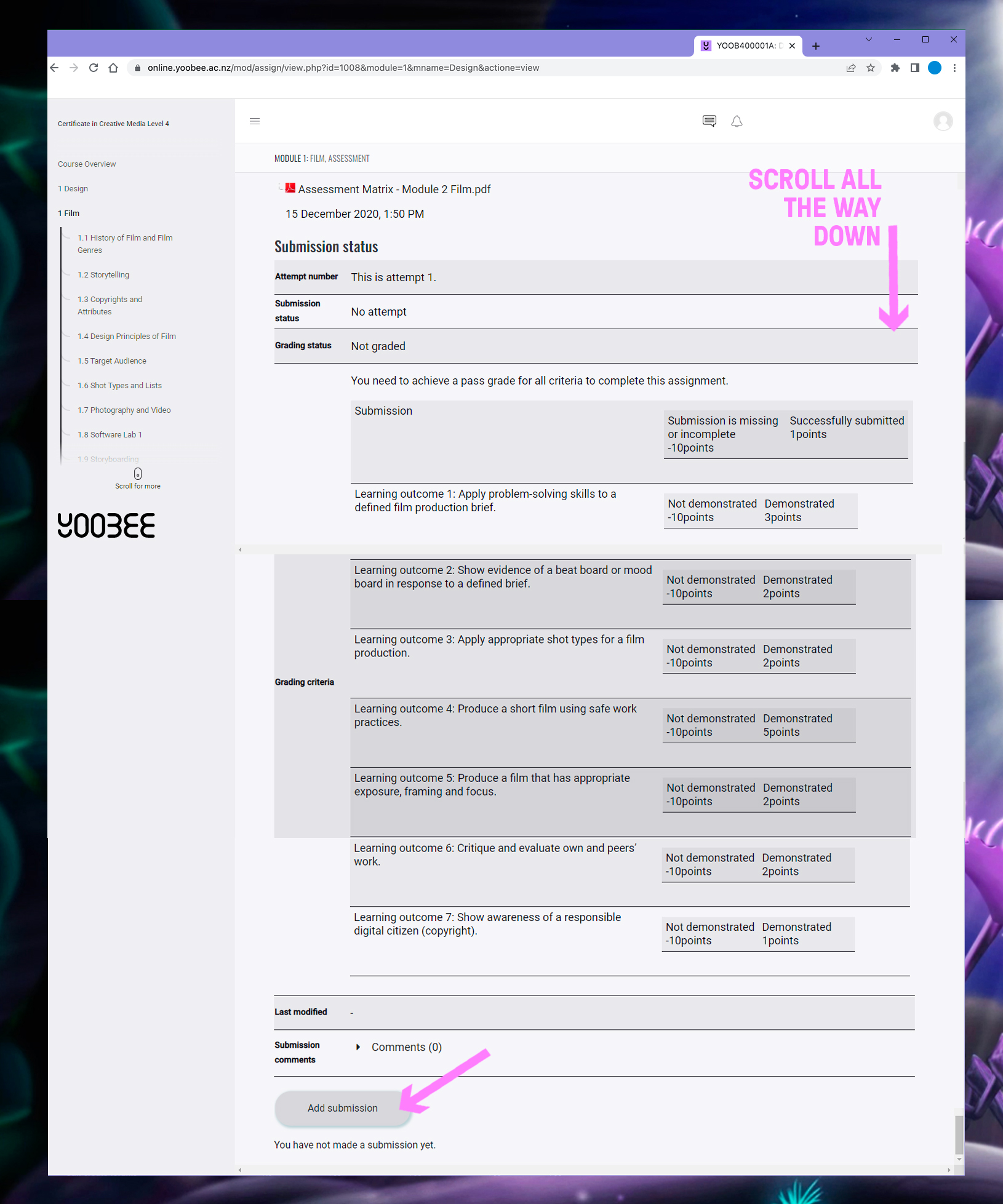
___
B. Drag and drop your assessment submission files (double-check that you are uploading the correct file).
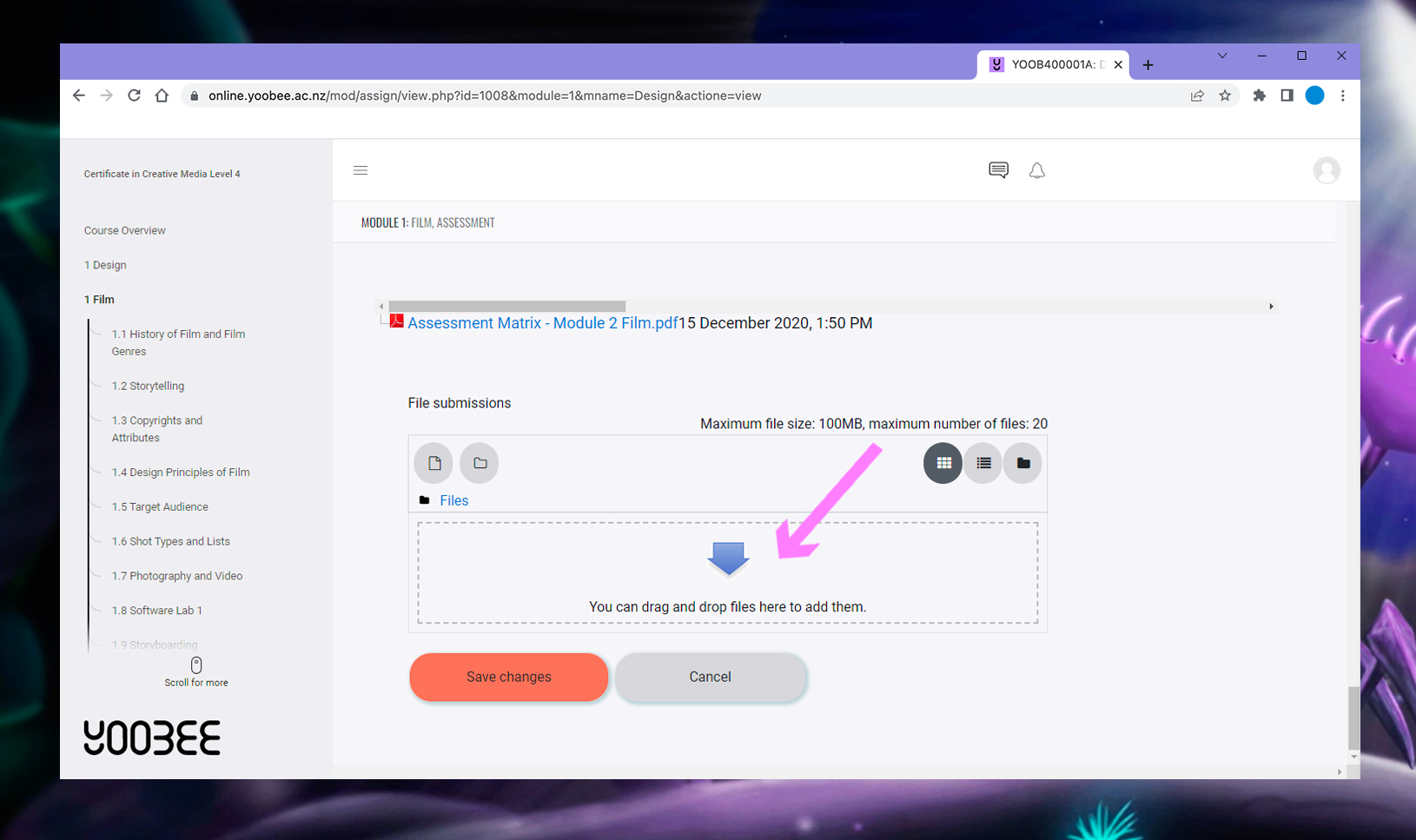
___
C. Once you have your Assessment submission visible, click Save changes.
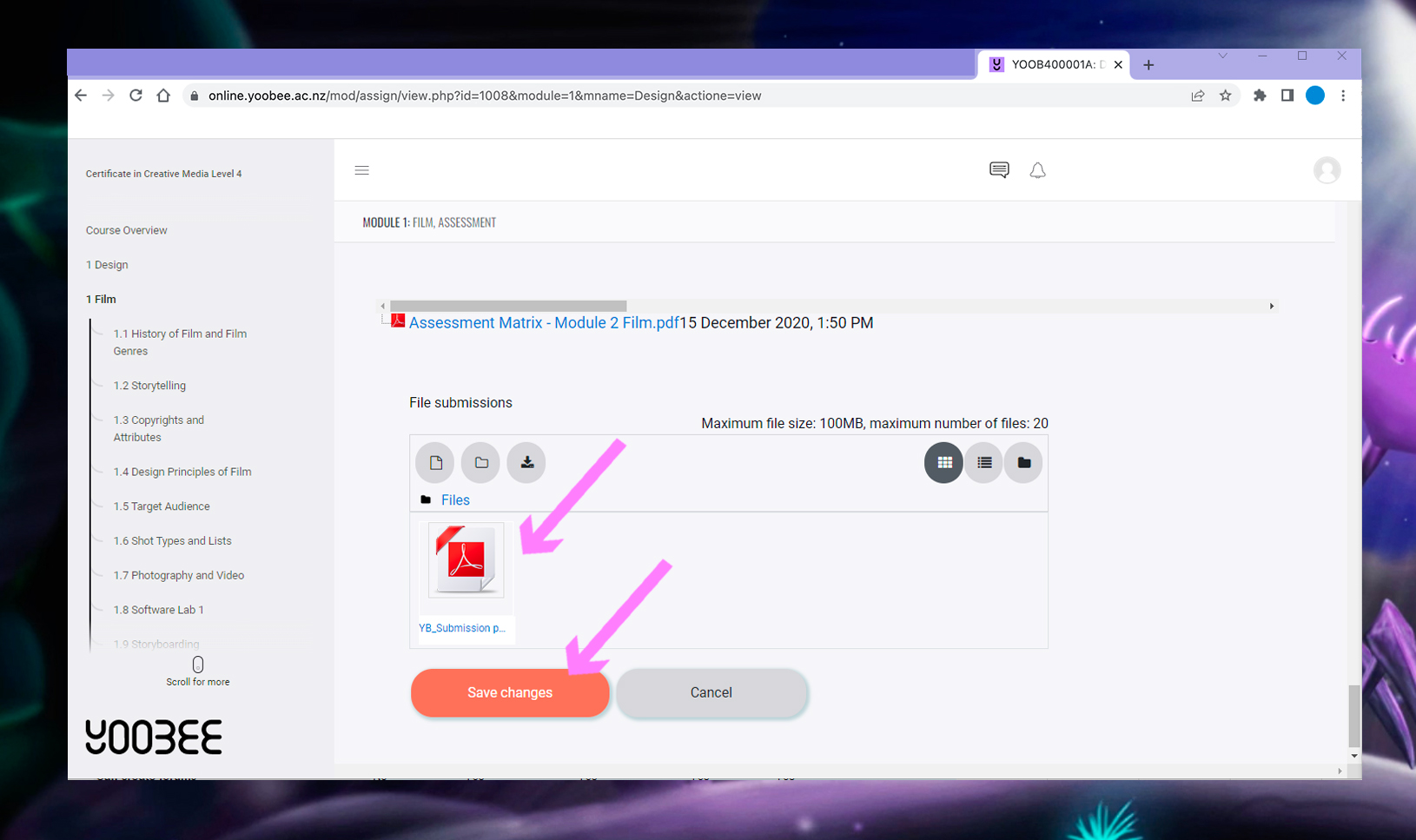
___
D. If you have uploaded the wrong file or suddenly remember you have not completed the assessment correctly, click Edit submission. You can then go back and check your submission or upload a different file.
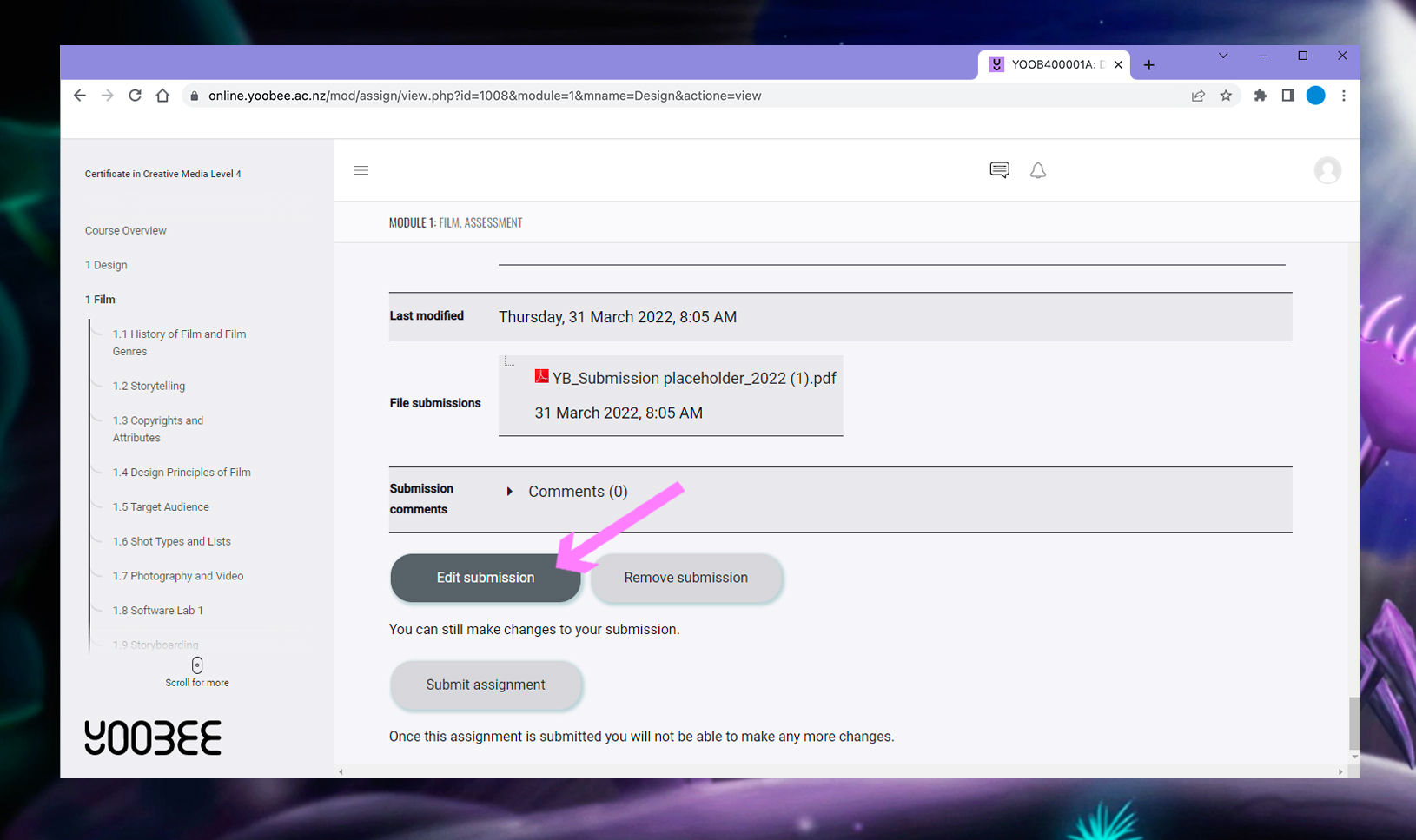
___
E. If you are sure you have the right file and are ready to submit your assessment, click Submit assignment.
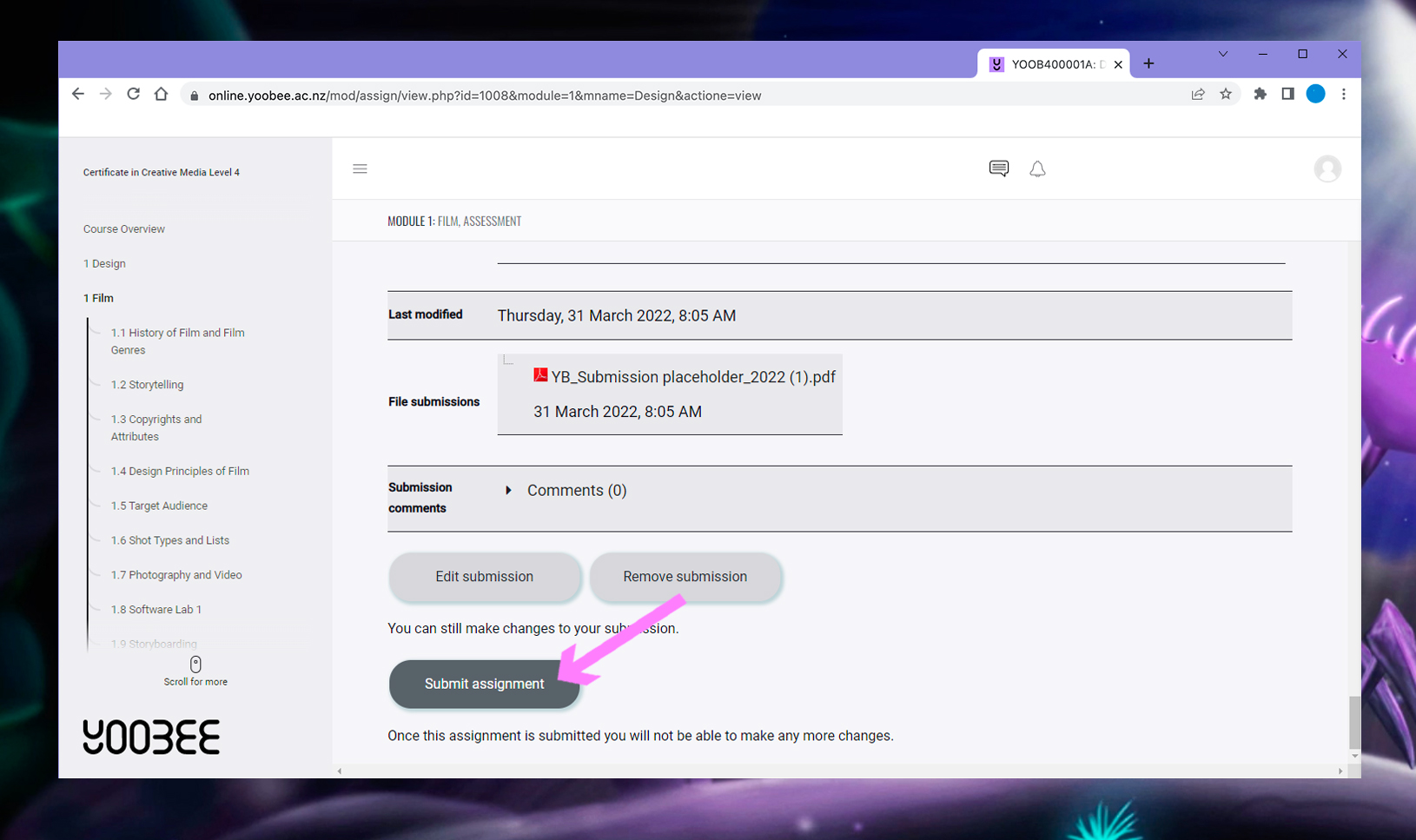
___
F. Then confirm the submission by checking the box and clicking Continue.
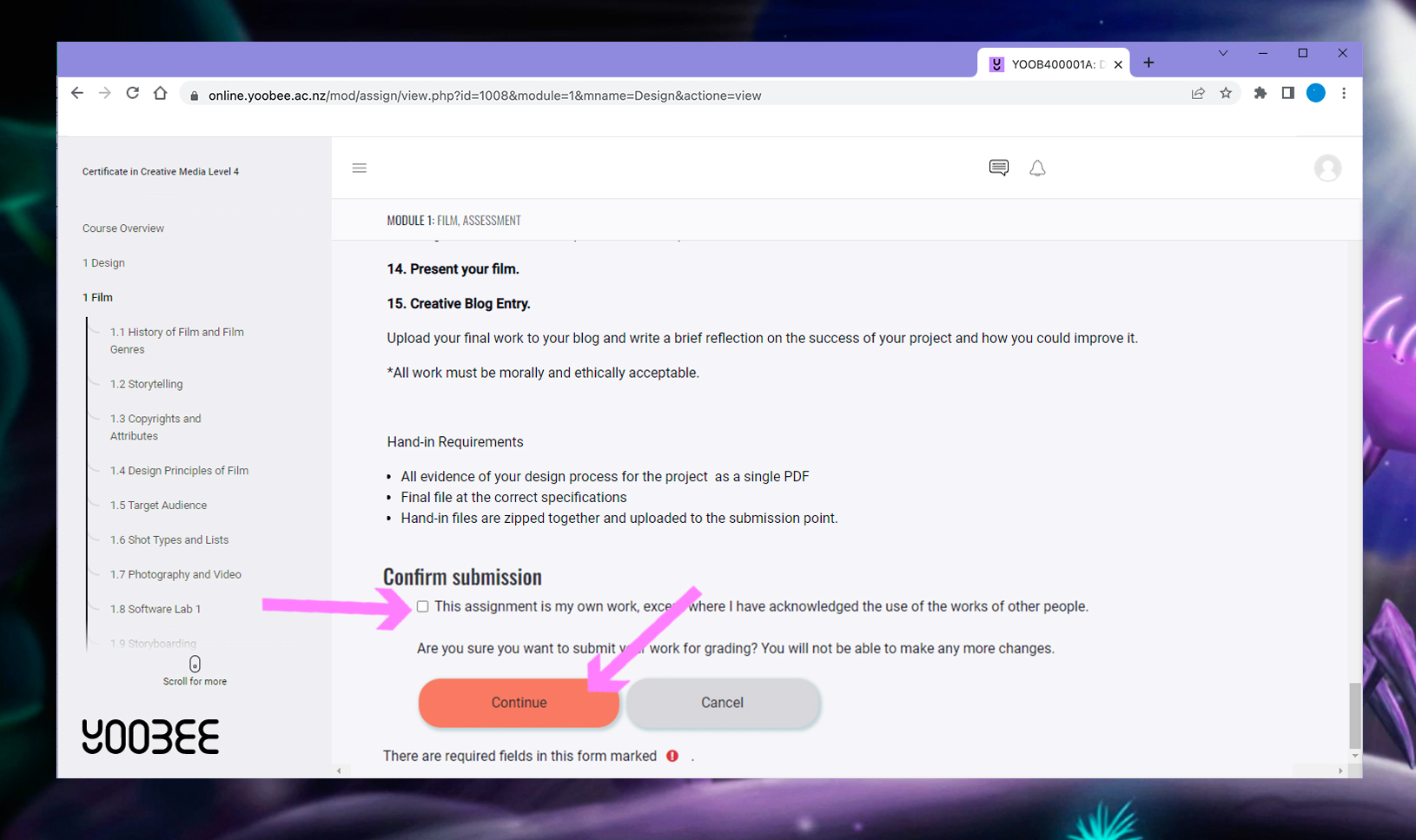
This is the step that takes your draft submission into final submission and confirms to the tutor your assessment is ready for marking. Yippee! (Remember, marking takes up to 15 working days from the due date).
___
G. Once you have submitted this final submission, you will receive a notification. Please check you have received this. If you have not, go back to step E and follow the steps to take your submission from draft to final.
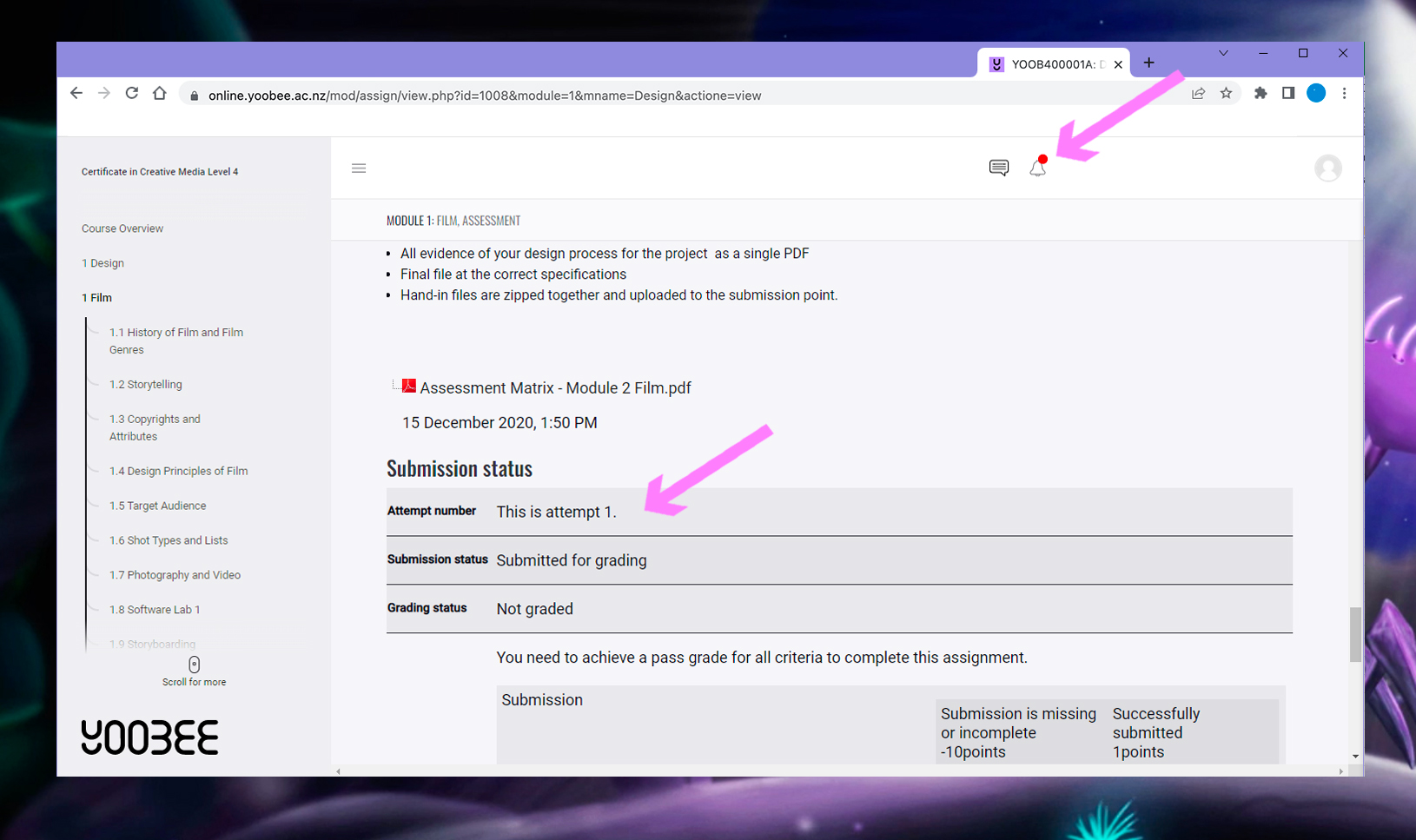
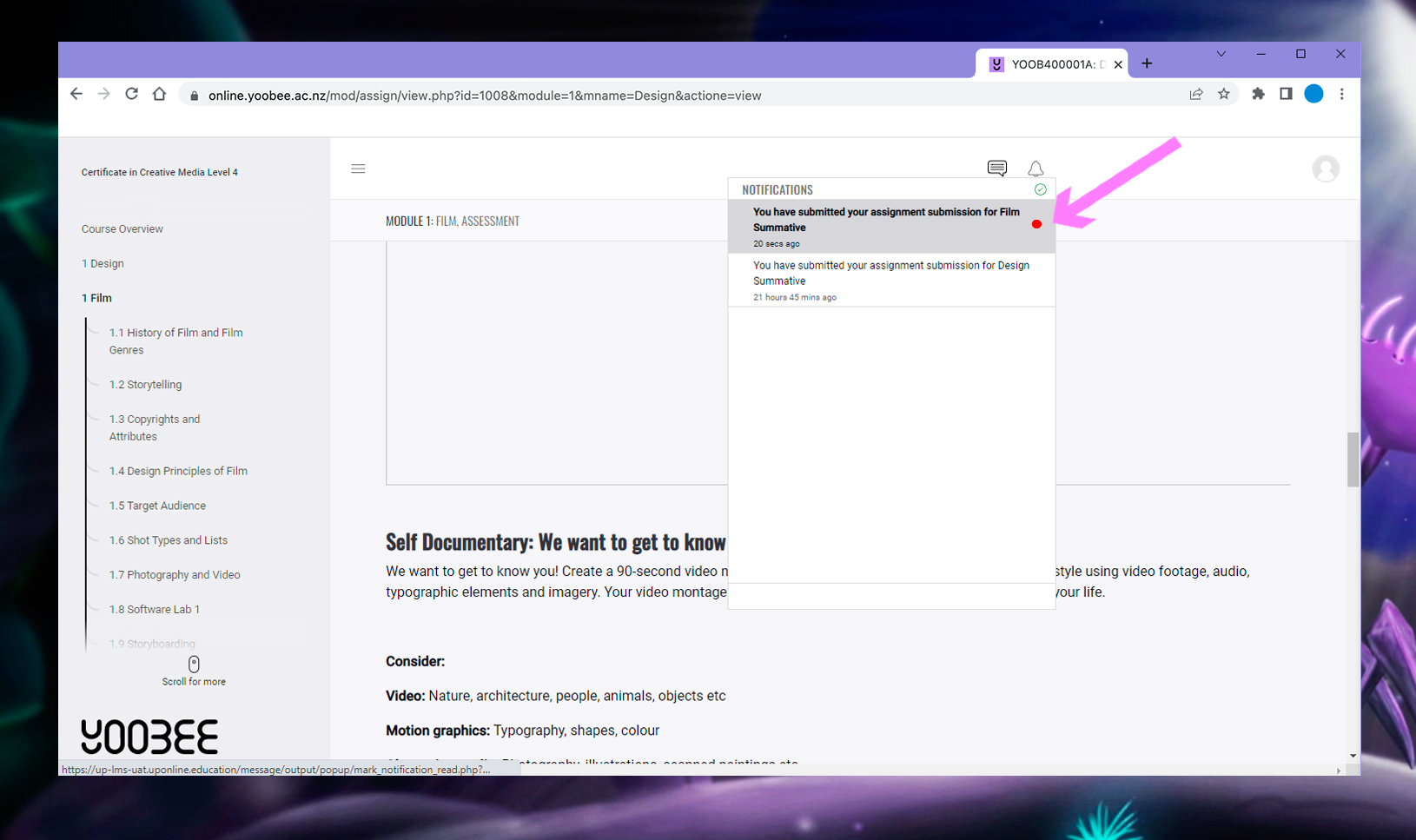
__________
Operating in an online environment requires respect for each other's learning and time, and this is achieved through using Netiquette: the proper etiquette (the rules and norms) when you are studying and interacting with others online. This is essential to keep communication flowing in a considerate, kind and respectful way.
Remember, the people you are communicating with are people working in an online environment, too, with outside commitments as well as study. Look at the advice given in the various sections below to support your online experience on your learning journey.
Engage – don’t lurk
When you are studying online at Yoobee, you are not alone. You are part of a large community. It’s important to be a part of this community by contributing as well as asking for ideas, feedback, comments, thoughts and support.
Give supportive but honest feedback
Feedback is a gift, but only when it is given in a kind and supportive way. Be honest and clear in your feedback and avoid offending.
When you are in Yoobee Online
Keep the chat box and messaging learning-related.
Sarcasm can backfire online
It might be difficult to understand and could cause offence.
Turn caps off
Just like in texting, using CAPS means you are shouting.
Take the time to fix the typos
Spelling mistakes can make your messages hard to read.
__________
